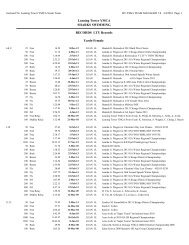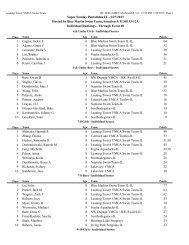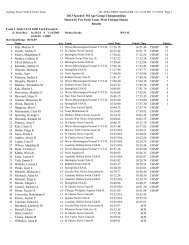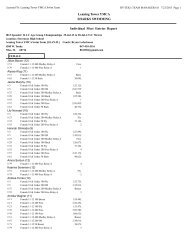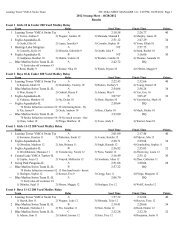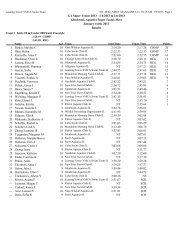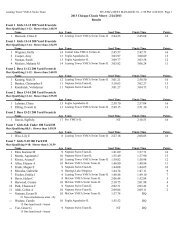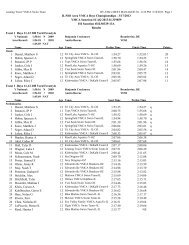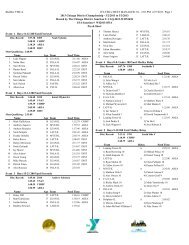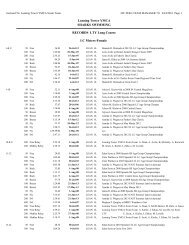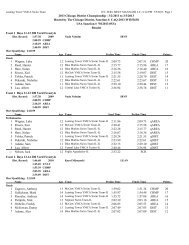leaning tower ymca sharks swim team-parent ... - Sharks Swimming
leaning tower ymca sharks swim team-parent ... - Sharks Swimming
leaning tower ymca sharks swim team-parent ... - Sharks Swimming
Create successful ePaper yourself
Turn your PDF publications into a flip-book with our unique Google optimized e-Paper software.
12. Equipment such as kickboards and pull buoys should be put away when the <strong>swim</strong>mer is<br />
finished using equipment so that the next group using the equipment will have it there to<br />
use.<br />
13. Swimmers will respect coaches and will listen when the coaches are speaking.<br />
NUTRITION AND SPORTS MEDICINE<br />
HYDRATION & NUTRITION<br />
How much you drink and what you drink is important to your performance and your health. Both<br />
are jeopardized when adequate amounts of fluids and food are not consumed during long-term<br />
events like a preliminary – finals championship meet, even when environmental conditions are not<br />
severe. If inadequate replacement fluids and fuels are not consumed during long-term exercise,<br />
dehydration glycogen depletion and low blood glucose levels can occur. This ultimately leads to<br />
reduced endurance, strength and performance.<br />
With the wealth of information available on fluid replacement and eating during events and the<br />
expensive advertising about sports drinks and energy bars, it is amazing how many <strong>swim</strong>mers<br />
overlook the importance of these practices during endurance training and competition.<br />
When muscle glycogen levels are low and blood glucose levels have dropped – no matter how fast<br />
you may want to go in a race – your body cannot respond, and you have “hit the wall”. During<br />
exercise, carbohydrates either in liquid or solid form appear to benefit performance by providing<br />
an additional source of energy.<br />
POST-EVENT NUTRITION<br />
The race is over, you pack up your gear and drink 10 to 12 ounces of water. After collecting your<br />
ribbons, you jump into your car and drive the two hours home before you sit down to a meal.<br />
The next day you’re tired the whole day and, even after a good warm-up, you still feel sluggish<br />
during your workout. For many years people have told you that you just went too hard in the race<br />
and may not have had enough training or yardage in order to recover from such a hard race. We<br />
now know better.<br />
Your muscles and liver have not completely refilled themselves with glycogen, which is the sugar<br />
that’s stored in the liver and muscles, and is of primary importance in sustaining power output<br />
during exercise. Research has shown that workouts or races that last over 60 to 90 minutes can put<br />
severe demands upon your body’s glycogen stores. If the workout was long and hard enough, your<br />
muscles may even “bonk” during the event.<br />
In addition to endurance exercise, high intensity exercise can deplete your glycogen stores rapidly.<br />
As little as 10 intervals lasting 90 to 120 seconds can severely deplete your carbohydrate stores.<br />
So when training and competing in our sport, <strong>swim</strong>ming, your muscles will most likely be<br />
depleted of glycogen in this situation.<br />
http://www.LTY<strong>Sharks</strong>.com<br />
LTY.<strong>Sharks</strong>@Comcast.net<br />
LTY Hotline: 847-410-5116 9/18/2007<br />
Page 28



